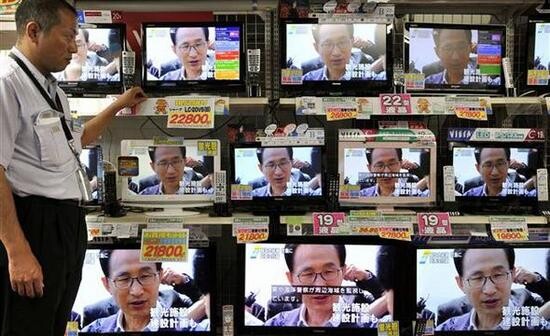hankyoreh
Links to other country sites 다른 나라 사이트 링크
Japan could take Dokdo issue to the International Court of Justice

By Jeong Nam-ku, Tokyo correspondent
Tokyo is warning about strong action after President Lee Myung-bak’s surprise August 10 visit to Dokdo. For now, it plans to take the Dokdo issue before the International Court of Justice (ICJ), but it has also put a halt to moves by some sitting Cabinet ministers to visit the Yasukuni Shrine.
Japan previously made two proposals to Seoul to resolve the Dokdo issue before the ICJ. The first came in 1954, and the second at a summit talk between the two countries’ foreign ministers in 1962. Korea rejected the offer both times and no trial was held.
For the past fifty years, Japan has declined to play the ICJ card “out of consideration for Korea.” But Japanese foreign minister Koichiro Genba said at an August 11 press conference that there was “no longer any need to show such consideration.”
Japan‘s concern is that if Korea rejects the offer this time, there won’t be an ICJ trial. Indeed, Seoul is almost certain to turn it down.
But the Japanese government is hard at work promoting the idea with its public that even if South Korea rejects a trial, the proposal will still have a significant impact by alerting the international community to the legitimacy of its own claims.
In an interview with the Asahi Shimbun, a Japanese foreign ministry official said, “If there’s a trial at the ICJ, we will win.”
“Even just our playing this card will rattle Seoul, as its senses the scrutiny from the international community,” the official added.
Meanwhile, Genba pointed to Seoul’s emphasis on pushing for a “Global Korea.” “Obviously, they’re going to have to agree to taking the matter up” at the ICJ, he said.
“Things aren’t going to take long,” he added.
A senior official with the South Korean Foreign Ministry said the basic position there was not to respond to any ICJ complaint by Japan because Dokdo is “clearly South Korean territory.”
“Japan’s aim is to ignite an international dispute over Dokdo,” the official said. “This is an unjustifiable attempt to turn what is clearly our territory into a dispute, and there’s simply no reason to allow ourselves to get caught up in it.”
While all this has been going on, Tokyo has moved to stop some of its ministers from visiting the Yasukuni Shrine from the upcoming August 15 anniversary to the end of the Pacific War.
Prime Minister Noda Yoshihoko, who is scheduled to return to work on August 15 after leaving for vacation on August 11, said ministers should refrain from visiting the shrine, where the remains of some Class A war criminals are kept.
Speaking at a press conference when he assumed office in September 2011, Noda said neither he nor his ministers would make any official visit to the shrine. Observers saw his latest remarks as an indication that he doesn’t intend to break with this policy after the Dokdo visit. Land minister Hata Yuichiro and other members of the Cabinet said Friday they intended to visit Yasukuni as private citizens.
Tokyo is said to be worried about the effects such visits would have at a time when far-right groups have already been acting up in the wake of Lee’s visit to Dokdo. One member threw a brick through a window at the South Korean consulate in Hiroshima, and groups have been protesting in Tokyo and other cities.
Both countries have elections coming up, and many observers in Japan are saying the tensions are unlikely to be resolved before then. Most are saying that the two countries’ “shuttle diplomacy” efforts, where leaders take turns visiting each other’s country, are pretty much over for the year.
Please direct questions or comments to [english@hani.co.kr]

Editorial・opinion
![[Column] Season 2 of special prosecutor probe may be coming to Korea soon [Column] Season 2 of special prosecutor probe may be coming to Korea soon](https://flexible.img.hani.co.kr/flexible/normal/500/300/imgdb/original/2024/0426/3317141030699447.jpg) [Column] Season 2 of special prosecutor probe may be coming to Korea soon
[Column] Season 2 of special prosecutor probe may be coming to Korea soon![[Column] Park Geun-hye déjà vu in Yoon Suk-yeol [Column] Park Geun-hye déjà vu in Yoon Suk-yeol](https://flexible.img.hani.co.kr/flexible/normal/500/300/imgdb/original/2024/0424/651713945113788.jpg) [Column] Park Geun-hye déjà vu in Yoon Suk-yeol
[Column] Park Geun-hye déjà vu in Yoon Suk-yeol- [Editorial] New weight of N. Korea’s nuclear threats makes dialogue all the more urgent
- [Guest essay] The real reason Korea’s new right wants to dub Rhee a founding father
- [Column] ‘Choson’: Is it time we start referring to N. Korea in its own terms?
- [Editorial] Japan’s rewriting of history with Korea has gone too far
- [Column] The president’s questionable capacity for dialogue
- [Column] Are chaebol firms just pizza pies for families to divvy up as they please?
- [Column] Has Korea, too, crossed the Rubicon on China?
- [Correspondent’s column] In Japan’s alliance with US, echoes of its past alliances with UK
Most viewed articles
- 1[Column] Season 2 of special prosecutor probe may be coming to Korea soon
- 2‘We must say no’: Seoul defense chief on Korean, USFK involvement in hypothetical Taiwan crisis
- 3No good, very bad game for Korea puts it out of Olympics for first time since 1988
- 4Is Japan about to snatch control of Line messenger from Korea’s Naver?
- 5Division commander ordered troops to enter raging flood waters before Marine died, survivor says
- 6Is N. Korea threatening to test nukes in response to possible new US-led sanctions body?
- 7Korea’s 1.3% growth in Q1 signals ‘textbook’ return to growth, says government
- 8N. Korean delegation’s trip to Iran shows how Pyongyang is leveraging ties with Moscow
- 9[Editorial] Korea’s surprise Q1 growth requires objective assessment, not blind fanfare
- 10Amnesty notes ‘erosion’ of freedom of expression in Korea in annual human rights report